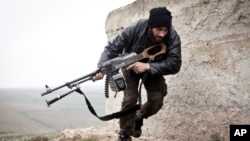A top Syrian rebel commander fears insurgent successes against Russian-backed Syrian government forces in central Syria the past two days may prompt Moscow to escalate its intervention to save its client, President Bashar al-Assad, and deploy ground troops.
General Salim Idris is jubilant at the successes Free Syrian Army rebels have notched against Assad, whose forces launched ground offensives this week in the center and northwest of the war-torn country with close-ground support from Russian warplanes. He worries, however, about what is to come.
The biggest Syrian government offensive is in the countryside around Hama, and "the regime lost more than 20 tanks, lost a lot of soldiers and officers and vehicles" there, Idris said. In Latakia, the coastal province, FSA rebels "shot down three helicopters, and it is a very good success."
U.S.-supplied TOW anti-tank missiles have proved decisive against Assad's armor, but the rebels are fast running out of supplies, Idris told VOA in an exclusive interview.
The general, who defected from the Syrian army early in the civil war in 2012, said his biggest worry, though, is that Moscow will send in its own soldiers. He said that at the moment, the only Russians on the front lines are some officers and advisers. He fears that the Syrian government forces' recent setbacks will change that.
"Now everything is to be expected," he said, frowning. "Maybe they will send troops to fight for the regime because, as you know, the airstrikes cannot control the territory. And the last two days gave them a very important lesson."
News that a top Iranian general had been killed Thursday night near Aleppo came as VOA was interviewing Idris. The Iranian, who was killed by Islamic State extremists, not the FSA, was playing a key coordination role between the Syrian army and Iranian volunteers fighting for Assad.
Idris said that so far, Iranian guardsmen, Iraqi Shia fighters and militiamen from the radical Lebanese Shia movement Hezbollah, who have all been fighting on behalf of Assad, have been mainly concentrated in the west of Syria, close to the border with Lebanon and in the Syrian capital, Damascus. They have not played a vanguard role in the battles in central Syria and in the northwest toward Latakia, an Assad stronghold.
That, too, could change as the Syrian army flounders.
Rebels' needs
The general sighed when asked what the rebels need. As well as anti-tank weapons, he said, they need shoulder-fired anti-aircraft missiles, known as MANPADS. Idris said he tried many times over the past four years to persuade the West and Gulf countries to supply MANPADS, but they feared the missiles would fall into jihadist hands. He holds out no hope now that they will rethink their position and supply a weapon that would be a game-changer on the battlefield. "It is a hopeless case," he said.
He fears that now that the Russians are intervening, the West will reduce its overall support of the Syrian revolution, not wanting to get embroiled in a Cold War-style proxy war. He said he was shocked to learn that the Pentagon will stop the training and equipping of rebel fighters, a program that has been plagued with problems but one the general said could still be useful. "I am very sad," he said.
He added, "I expect, maybe, that the support will be less and less. And I told commanders yesterday, they have to think that someday they will not receive any support."
The future of the revolution will be decided only by those fighting on the ground, the general said.




